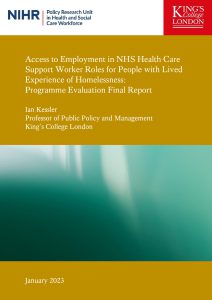 The NIHR Policy Research Unit in Health and Social Care Workforce has published an evaluation of an access to employment programme in the NHS targeted at those with lived experience of homelessness. The pilot programme involved the homelessness charities Pathway and Groundswell and five NHS Trusts in England. Report author, Ian Kessler, here outlines the programme and the main findings of his evaluation.
The NIHR Policy Research Unit in Health and Social Care Workforce has published an evaluation of an access to employment programme in the NHS targeted at those with lived experience of homelessness. The pilot programme involved the homelessness charities Pathway and Groundswell and five NHS Trusts in England. Report author, Ian Kessler, here outlines the programme and the main findings of his evaluation.
Ian Kessler is Deputy Director of the NIHR Policy Research Unit in Health and Social Care Workforce. He is also Professor of Public Policy and Management at King’s Business School. (1,016 words)
Widening participation in the healthcare workforce has long been an important policy objective in the NHS. This has been reflected in an equalities, diversity, and inclusion agenda traditionally centring on gender and race, and more recently on young people with disabilities with the introduction of supported employment programmes by NHS Trusts, such as Project Search and Choice. However, the pursuit of widening participation is a rich policy space, connecting to an increasing range of workforce and broader service priorities.
Framed as ‘anchor institutions’, playing a key role as local employers, NHS Trusts have been encouraged to develop workforces which reflect, in socio-economic and demographic terms, the communities they serve. This role overlaps with moves to bring into the NHS workforce people with lived experience of various health conditions as a means of delivering patient-centred services and more effectively addressing health inequalities. Such moves have been especially evident in the introduction of the peer support worker role in mental health (which our Unit evaluated many years ago). More prosaically, but perhaps most pressing, the search for workforce diversity and inclusion addresses the recruitment and retention challenges faced by healthcare employers, with those at the margins of employment representing a new and reliable source of labour. Continue reading